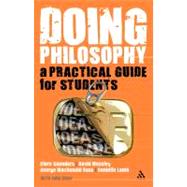
| Preface | p. viii |
| Introduction | p. 1 |
| Studying philosophy | p. 3 |
| What is philosophy? | p. 3 |
| What philosophers think about | p. 5 |
| Why study philosophy? | p. 8 |
| What does studying philosophy involve? | p. 10 |
| Summary | p. 13 |
| Reading philosophy | p. 15 |
| What to read | p. 15 |
| The reading list | p. 15 |
| How to read | p. 27 |
| Reading philosophically | p. 27 |
| What makes reading philosophy challenging? | p. 48 |
| Summary | p. 66 |
| Taking notes | p. 69 |
| Why is note-taking important? | p. 69 |
| Recording what you have learned | p. 69 |
| Engaging with the material | p. 70 |
| Content - what should I write down? | p. 70 |
| Summarizing material | p. 70 |
| Evaluating material | p. 71 |
| Recording your sources | p. 72 |
| Method - how should I go about taking notes? | p. 72 |
| Use your own words | p. 73 |
| Use quotations carefully | p. 73 |
| Leave plenty of room on the page | p. 74 |
| Distinguish between different types of information | p. 74 |
| Find ways to relate different pieces of information | p. 74 |
| An example of effective note-taking | p. 75 |
| Tailoring your methods to your context | p. 77 |
| Making notes in lectures | p. 77 |
| Making notes from your reading | p. 78 |
| Making best use of your notes | p. 82 |
| Reviewing your notes | p. 82 |
| Comparing your notes | p. 83 |
| Storing your notes | p. 85 |
| Summary | p. 86 |
| Discussion | p. 87 |
| The value of discussion | p. 87 |
| Active learning | p. 88 |
| Contested subjects | p. 88 |
| Roots of philosophy | p. 89 |
| Discussion seminars | p. 90 |
| Preparation | p. 91 |
| The discussion itself | p. 94 |
| Other forms of discussion | p. 98 |
| Presentations | p. 98 |
| Electronic discussion | p. 99 |
| Summary | p. 100 |
| Writing philosophy | p. 101 |
| What to write | p. 101 |
| The essay question list | p. 102 |
| Preparing to write | p. 107 |
| How to write | p. 107 |
| What is philosophical writing? | p. 107 |
| Structuring the essay writing process | p. 109 |
| Planning your essay | p. 112 |
| How to avoid plagiarism | p. 115 |
| Writing your essay | p. 122 |
| Example essay questions | p. 125 |
| Example essay A | p. 126 |
| Example essay B | p. 131 |
| Example essay C | p. 135 |
| Example essay D | p. 144 |
| Example essay E | p. 150 |
| Assessment and feedback | p. 157 |
| The purpose of assessment | p. 157 |
| Why bother with feedback? | p. 157 |
| Sources of feedback | p. 158 |
| Understanding your feedback | p. 160 |
| Using your feedback | p. 163 |
| Summary | p. 165 |
| Resources | p. 166 |
| Library resources | p. 166 |
| Books | p. 167 |
| Journals | p. 169 |
| Copyright | p. 170 |
| Referencing | p. 171 |
| Internet resources | p. 172 |
| Support systems | p. 175 |
| Student centres | p. 175 |
| Careers centres | p. 175 |
| Disability services | p. 175 |
| Philosophy societies | p. 176 |
| Subject associations | p. 176 |
| Some useful philosophical terms | p. 177 |
| Metaphysical terms | p. 177 |
| Epistemological terms | p. 178 |
| Semantic/logical terms | p. 179 |
| Index | p. 181 |
| Table of Contents provided by Ingram. All Rights Reserved. |
The New copy of this book will include any supplemental materials advertised. Please check the title of the book to determine if it should include any access cards, study guides, lab manuals, CDs, etc.
The Used, Rental and eBook copies of this book are not guaranteed to include any supplemental materials. Typically, only the book itself is included. This is true even if the title states it includes any access cards, study guides, lab manuals, CDs, etc.